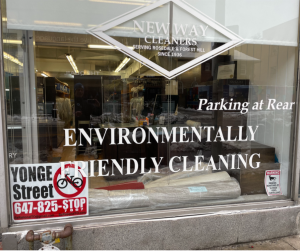The Right To A Safe Road Should Not Be Up For Debate
Toronto city council finally approved the midtown complete street pilot — safety improvements for pedestrians and cyclists along Yonge Street between Bloor Street and Davisville Avenue — in early February.
The decision only came after months of community advocacy and mobilizing concerned citizens into pro and con camps that aligned with competing petitions. There were thousands of emails and letters, and dozens of deputations brought forth, while city staff worked on multiple studies and consulted a small army of experts.
It shouldn’t be so hard to get a safe street.

The battle over a Complete Street on Yonge included an opposition sign campaign against bike lanes. This sign offered a curious juxtaposition.
A better starting point would be to acknowledge the right of residents to safely walk, cycle, and otherwise enjoy our roads — and invest the public’s energy and resources into figuring out how best to get it done.
Public consultations about installing a bike lane, wider sidewalk, or other safety feature should be focused on “how” not “if.”
We don’t debate the right of children to an education or the ill to medical treatment each time we build a school or hospital, so why endlessly debate the right to a safe road?
The irony of these exhausting fights is that while road tragedies remain common and we now have a clear path to ecosystem collapse, many politicians still treat changes to the car-dominated status quo with suspicion, as if they threaten a delicate balance achieved at the pinnacle of urban ingenuity.
Concerns ranging from traffic congestion to potential delays for emergency vehicles are valid, though more rationally directed at cars, SUVs, and pickups than the diminutive bicycle.
More importantly, it’s time to move on from claims that “we love cycling, but not here,” which simply divert public resources into searching for mythical places “where bike lanes make sense,” instead of implementing practical solutions.
The battle to make the midtown complete street pilot permanent has been won, but the length of the fight ensures that we are losing the war for our safety and our climate.
The (new) mayor and council would do well to state, unequivocally, that road safety is a right, not a prize to be won or lost by demonstrating majority community support.